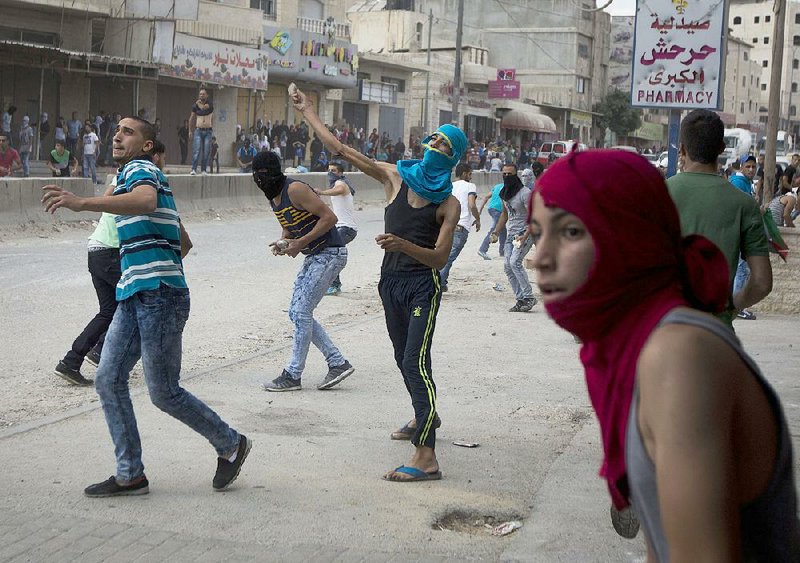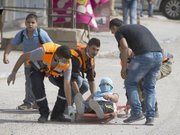SURDA, West Bank -- A new generation of angry, disillusioned Palestinians is driving the current wave of clashes with Israeli forces: Too young to remember the hardships of life during Israel's clampdown on the last major uprising, they have lost faith in statehood through negotiations, distrust their political leaders and believe that Israel only understands force.
Some say they want to emulate those killed or wounded in confrontations or attacks on Israelis -- like Mohannad Halabi, the 19-year-old law student from the West Bank who stabbed to death two Israelis in Jerusalem's Old City during the weekend before being shot dead by police.
"We are all impressed with what he has done," said Malik Hussein, a 19-year-old friend and fellow law student at Al-Quds University near Jerusalem. "The day after the attack, university students took to the streets and clashed with Israeli soldiers. Mohannad's way is the only way to liberate Palestine."
Despite such fervor and a rise in violence, it's not clear whether conditions are ripe for a new uprising against the Israeli military occupation, which began in 1967 when Israel captured the West Bank, Gaza Strip and east Jerusalem.
Israeli Prime Minister Benjamin Netanyahu has threatened a tough crackdown, saying he is sending thousands more police and soldiers to the West Bank and east Jerusalem, with a mandate to take "strong action" against anyone throwing stones or firebombs.
During the uprising in 2000-2005, Israel imposed unprecedented restrictions on daily life in Palestinian territories to try to end attacks on Israelis. Troops sealed off communities, keeping many Palestinians from jobs and schools. Long waits at Israeli checkpoints became common, and in the darkest days, tanks rolled through Palestinian cities and Israeli troops carried out mass arrest sweeps.
When violence ebbed, Israel gradually eased West Bank movement, but it continues to restrict Palestinian entry to Jerusalem. Many older Palestinians who lived through the hardships of the last uprising don't want to go through it again, focusing instead on personal goals, such as getting good jobs and sending their children to college.
The bloody past seems to be less of a deterrent for young Palestinians who hold little hope for a better future, including Palestinian statehood.
The March re-election of hard-liner Netanyahu to a fourth term deepened the sense of paralysis. Netanyahu says he is ready to negotiate a partition deal with Palestinian President Mahmoud Abbas, but he rejects internationally backed ground rules for such talks and continues to expand Jewish settlements on lands sought for a Palestinian state.
A major Jerusalem shrine that is central to the national identities of both sides and sparked major bouts of violence in the past also looms large in the rising tensions.
Home to the Al-Aqsa Mosque, the compound was the scene of frequent clashes in recent weeks between Palestinian stone-throwers and Israeli police, and young Palestinians routinely refer to perceived threats to Al-Aqsa in explaining their frustration.
Ahmed Halabi, a 22-year-old cousin of the Jerusalem assailant, said he hopes for a new uprising .
"What's going on here is unbearable," he said. "Al-Aqsa, the settlements, the killing in the streets. We have to move. We cannot stay silent."
The assailant, Mohannad Halabi, lived with his family in a new two-story home in the West Bank town of Surda, north of Ramallah, the seat of Abbas' self-rule government. His friends said he was closely following events at Al-Aqsa and supported the militant Islamic Jihad faction, even though he was not particularly religious.
His father, Shafiq, said his son's violent act came as a surprise, but that he was proud of him. "This generation cannot be controlled by family or any other authority," he said. "I think Netanyahu will have a hard time with them. Even we, the family, couldn't tell Mohannad what to do."
Besides the two Israeli men killed in the attack, the wife and 2-year-old son of one of the men were wounded. Adele Banita, the wounded woman, told Israeli media that Arab bystanders laughed and spat at her when she pleaded for help.
Early Monday, Israeli troops searched and measured the Halabi family home, presumably as a prelude to demolishing it, a punitive practice Israel has revived. After the soldiers left, a cousin, Majd al-Aryan, 16, plastered posters of the attacker on the walls of the house.
"Mohannad is a hero and everyone on town wants to be like him," he said. "We are proud of him."
A Section on 10/07/2015



